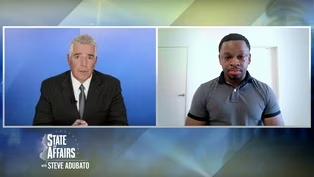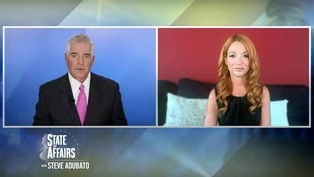State of Affairs with Steve Adubato
The impact of SNAP & Medicaid cuts to vulnerable populations
Clip: Season 9 Episode 24 | 9m 11sVideo has Closed Captions
The impact of SNAP & Medicaid cuts to vulnerable populations
Steve Adubato speaks with Adele LaTourette, Assistant Vice President of Policy & Advocacy at the Community FoodBank of New Jersey, about rising food insecurity across the state and the impact of Medicaid and SNAP cuts on vulnerable populations.
Problems playing video? | Closed Captioning Feedback
Problems playing video? | Closed Captioning Feedback
State of Affairs with Steve Adubato is a local public television program presented by NJ PBS
State of Affairs with Steve Adubato
The impact of SNAP & Medicaid cuts to vulnerable populations
Clip: Season 9 Episode 24 | 9m 11sVideo has Closed Captions
Steve Adubato speaks with Adele LaTourette, Assistant Vice President of Policy & Advocacy at the Community FoodBank of New Jersey, about rising food insecurity across the state and the impact of Medicaid and SNAP cuts on vulnerable populations.
Problems playing video? | Closed Captioning Feedback
How to Watch State of Affairs with Steve Adubato
State of Affairs with Steve Adubato is available to stream on pbs.org and the free PBS App, available on iPhone, Apple TV, Android TV, Android smartphones, Amazon Fire TV, Amazon Fire Tablet, Roku, Samsung Smart TV, and Vizio.
Providing Support for PBS.org
Learn Moreabout PBS online sponsorship[INSPRATIONAL MUSIC STING] - We're now joined by Adele LaTourette, who is Assistant Vice President of Policy and Advocacy at the Community FoodBank of New Jersey, one of our longtime partners, promoting greater public awareness around food insecurity issues.
Adele, good to see you.
- Good to see you, Steve.
- You got it.
Hey, we'll get right to this, 50 years Community Foodbank celebrating, talk about that.
- That's exactly right.
Kathleen started the FoodBank in 1975.
- Kathleen DiChiara.
- [Adele] Kathleen DiChiara, yes.
- [Steve] Out of a station wagon, right?
- Out of a station wagon, yep.
In the back of her station wagon in Newark.
- And right now, the Community FoodBank is the largest organization dealing with food insecurity issues in the state, correct?
- That's right.
We now serve 90 million meals annually.
So yeah, it's a new world.
- Talk about advocacy and public policy.
What would you say is the greatest impact of federal funding cuts?
We've had people on who debate this and say, "Steve, the cuts in SNAP, which stands for Supplemental Nutrition Assistance Program, SNAP, S-N-A-P, otherwise known as Food Stamps before that, that the cuts do not negatively impact people who are currently on SNAP.
You say.
- I disagree.
- Talk about it.
- I think what we really have to focus on is, so, SNAP brought in 1.9 billion into the state last year.
What H.R.1 did, the Big Bill, is, it's hard to call it cuts in certain instances.
And please tell me if I get too wonky because I kind of have a wonk reputation around here.
- You're talking about the federal legislation, the so called.
- Federal legislation.
- The Big Beautiful Bill that Congress passed by a narrow margin.
Go ahead.
- So, what it did was, it really erected more barriers.
It really made it more challenging to participate in the bill.
But I think also part of what happened, we have people going to food pantries that were saying, "SNAP doesn't exist anymore."
So much of it is kind of public perception, messaging around the program.
But again, yes, that bill, I think to me the biggest change is so much of the financial aspect of SNAP, formerly known as Food Stamps, is going to now come down to the state.
So at the state level, we'll be looking at increased cost of 100 to 300 million to operate the program.
And at the county level, we'll be looking at 78 million between the counties to run the program.
So, that's going to be a huge lift in terms of what the state can do and what the counties can do.
- So the new governor, who will take office in January 2026, this issue will be front and center.
- Absolutely, and not just SNAP.
We also have the Medicaid issue.
I think, in fact, I know what we need to do in New Jersey, and I'm just going to talk New Jersey because that's the state that I know.
We need to focus on making sure that we inform people about the changes, educate them about how they can comply.
We need a broader partnership.
We need a bipartisan partnership.
I optimistically really believe that New Jersey can lead the way in showing what we can do in a bipartisan way.
We are going to have to come at this regardless of who wins the governorship.
This is going to have a huge impact on the state and the people in the state who are hungry and food-insecure.
And I believe that no politician in New Jersey thinks that we should have hungry and food-insecure people living in our state.
So I think we have to work together, build bridges to one another, and make sure we focus on how we can help people comply, how we can build avenues of compliance, and how we can really make sure that people have access to the benefits they so desperately need.
- And as we talk about this, team put up the website for the Community FoodBank for people to find out how they can help.
By the way, people can help, right, Adele?
- They can help.
They absolutely can help.
- How?
- They can donate to the FoodBank.
They could donate to their local food pantry.
The food banks together as a group, last year served 1 million people per month.
Food banks cannot absolutely not fill in the gap that the loss of SNAP or the challenges to SNAP will produce.
We can't do it.
It's not possible.
Emergency food was never meant to do that.
Kathleen started the FoodBank in '75.
I came into this work in '79.
And back then, hunger looked very different.
It literally was, emergency food was emergent.
It was if people lost their power and the, you know, the groceries in the refrigerator.
It's changed now.
It's working families that come to our food pantries.
- I ask this of every one of your colleagues when we talk about food insecurity, and I'm going to try it with you as well.
So someone says, "My family is good.
We're okay.
It's tight, affordability in New Jersey is not easy, but we have food on the table.
Why is someone else's, another family's challenge around access to healthy food, food insecurity, why is that my problem?
Why should I be concerned?"
Tell folks.
- I think it's about living in community, living in your own community.
I mean, people who are in need of food, they're your neighbors.
It's not an us and them, it's just not.
It's people who are your neighbors, people who are your friends, people who are alongside you at the grocery store.
To me, that's basic definition of community.
- Do we not even, Adele, sorry for interrupting.
Do we not even know who's struggling?
- No, absolutely not.
You cannot look at a person and say that person is not struggling.
We have hunger, food insecurity in every single county in this state, which is another thing that's changed.
It really is your neighbor.
It really is someone who's potentially in your family.
It's everyone.
There is no particular demographic.
It's universal.
- What is this Map the Meal Gap study?
- So basically, Feeding America really takes a look at what they are- - Feeding America is a national organization.
- Feeding America, yes, sorry.
A national organization of food banks, of which we are a member.
And basically, it measures what the meal gap is in terms of food insecurity.
So, the most recent study had about one in nine people in New Jersey who are food-insecure.
I tend to think that number is higher.
I think reporting hunger and food insecurity is challenging because I think a lot of people will not talk about what it is they need, and I think going by how much people earn is deceiving.
Again, cost of living in New Jersey is very high.
I think more people are struggling than ever.
So I'm not a huge believer in statistics.
I think everything statistically should be taken with a grain of salt.
I think the numbers are bigger, basically.
- Adele LaTourette is the Assistant Vice President of Policy and Advocacy for a terrific organization.
They've been doing it for 50 years.
Our late friend, Kathleen DiChiara, who started this organization in 1975.
Actually, check out the piece that we did on our sister series, Remember Them, with my colleague Jacqui Tricarico.
The website for Remember Them will come up.
We did a piece on Kathleen and why, even though she's no longer here with us in person, she's here with us in spirit.
- Totally.
- And her legacy lives on.
- Absolutely.
- Adele, thank you so much.
- Thank you so much, Steve.
- You got it.
Stay with us, we'll be right back.
- [Narrator] State of Affairs with Steve Adubato is a production of the Caucus Educational Corporation.
Funding has been provided by Valley Bank.
NJM Insurance Group.
New Jersey Sharing Network.
IBEW Local 102.
RWJBarnabas Health.
Let’s be healthy together.
The Port Authority of New York and New Jersey.
Horizon Blue Cross Blue Shield of New Jersey.
The New Jersey Economic Development Authority.
And by Robert Wood Johnson Foundation.
Promotional support provided by NJBIA.
And by Insider NJ.
- (Narrator) For the last 125 years, the International Brotherhood of Electrical Workers Local 102 has powered progress and built a brighter future.
As we celebrate this incredible milestone, we honor the dedication of our past, the strength of our present, and the promise of our future.
Together, we're stronger.
Together, we're Local 102.
Empowering veterans through advocacy, support, and resources
Video has Closed Captions
Clip: S9 Ep24 | 9m 23s | Empowering veterans through advocacy, support, and resources (9m 23s)
Finding meaningful solutions to New Jersey's energy crisis
Video has Closed Captions
Clip: S9 Ep24 | 9m 19s | Finding meaningful solutions to New Jersey's energy crisis (9m 19s)
Providing Support for PBS.org
Learn Moreabout PBS online sponsorship
- News and Public Affairs

Top journalists deliver compelling original analysis of the hour's headlines.

- News and Public Affairs

FRONTLINE is investigative journalism that questions, explains and changes our world.












Support for PBS provided by:
State of Affairs with Steve Adubato is a local public television program presented by NJ PBS

